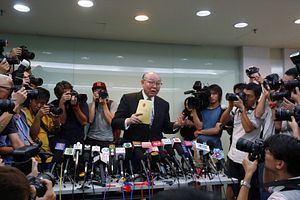A new contender has arrived for the seat of Hong Kong’s next chief executive as retired High Court judge Woo Kwok-hing, 70, officially declared his candidacy for the position in the coming March elections. In fact, Woo was the only official contender when the news broke on Wednesday.
A retired judge of the First Instance of the High Court, Woo had also previously served in a number of political roles, including chairman of the former Election Commission, from 1993, while Hong Kong was still a British colony, through its transition to Chinese rule, when the body was subsequently renamed the Electoral Affairs Commission. Woo was a key architect and commissioner until 2012, overseeing the elections of Hong Kong’s initial two chief executives. He was also the first commissioner on interception of communications and surveillance between 2006 and 2012.
Launching his campaign, Woo said that he decided to participate in the election because Hong Kong had become such a polarized and fragmented community.
“I believe my experience as barrister and judge over the past 46 years has imparted in me a deep understanding of multiple aspects of Hong Kong society and culture,” Woo told reporters.
He did not hold back on his criticism of the maligned incumbent chief executive, CY Leung, either.
“Politically, we have reached a stalemate,” Woo said. “I don’t think CY Leung has addressed public grievances, and halt[ed] the division of our society to ensure that Hong Kong’s best overall interests are served.”
This should give the pro-Beijing camp something new to think about. Over the past few weeks, they have been actively trying to maintain their Legislative Council majority control by calling for a judicial review over the swearing in of two elected localist legislators. Their initial indignation at the two upstarts’ disrespectful oaths during their swearing-in ceremony, and by extension, their indignation at the disrespect shown for the Basic Law, quickly made a sharp turn when it looked like the new Legislative President Andrew Leung Kwan-yuen, once an ally but now increasingly looking like a politically neutral president, would allow them to retake their oaths. Chief Executive CY Leung and Justice Secretary Rimsky Yuen called for a judicial review of Andrew Leung’s decision, which in itself has far reaching implications for the current Basic Law mechanisms that separate the powers of the executive, the courts, and the legislature.
Politicians who have met Woo in the past few days are positive about his personality. According to the lawmaker Helena Wong Pik-wan of the Democratic Party, Woo said he had considered running as early as March mainly because he disagreed with CY Leung’s approach. Wong said that Woo had never agreed with Beijing and CY Leung’s 2014 decision to bar open elections, a move which sparked the Umbrella Movement that same year, and that he believes in universal suffrage for the election of all lawmakers as well as the chief executive. Under the current system, the chief executive is elected by the 1,200-member Election Committee rather than the public at large.
Woo said he had not consulted Beijing about his candidacy, but had told some people with contacts in Beijing about his intentions.
“The information I have gathered is that the central government has no response,” said Woo.

































